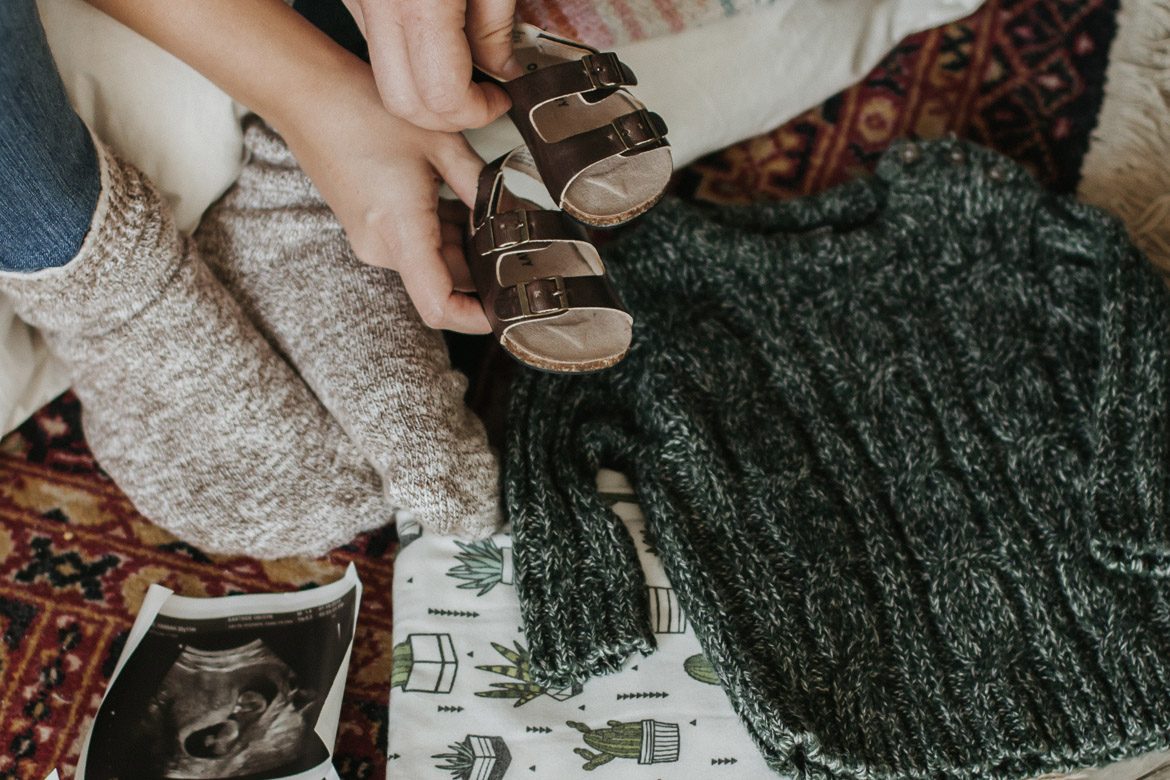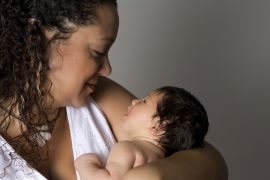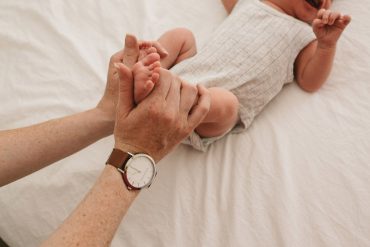By Abigail Rasminsky
When a woman conceals the first trimester of pregnancy, who is she trying to protect?
These days when I leave the house, I take the refrigerator with me. For a three-hour-long journey, I pack two peanut butter sandwiches, two yogurts, an apple, two oranges, crackers, water, and ginger ale. For a shorter trip – to the bank, let’s say – I’ll make a go of it with only one sandwich, one yogurt and one piece of fruit. This is not my lunch, mind you: I pack all this up after having eaten a full meal. My snacks have become my security blanket and my lifeline.
At 13 weeks pregnant, I shovel food into my mouth and it disappears. An hour after eating a solid meal, I am ravenous. Unlike in my pre-pregnancy life, where hunger arose and I had time to decide what and where I wanted to eat, now, if I fail to eat within three minutes, I risk throwing up. It’s a little like getting to the beeping alarm code before the siren goes off and the police are on their way. I shouldn’t even call this hunger. It’s more like trying to stop up an ever-expanding hole.
I eat on the subway, on the street, at my desk, in bed. I’ve made a habit of forcing the street-food guy to turn on the oil to cook me fries at 10:30 a.m. Every night as my husband and I are watching Homeland – I wouldn’t recommend this for pregnancy viewing – I usually start to moan. All I really want to do is sleep – early pregnancy is notorious for causing exhaustion that feels utterly obliterating – my husband pauses the episode and puts our emergency food plan into action. He pulls me into the kitchen as though we were seeking shelter during a bomb scare.
Is this the part I’m not supposed to tell you?
Like 50 to 80 per cent of women in their first trimester, I have “morning sickness,” which anyone who has ever had it knows is the most evil misnomer of all time. “Morning sickness” makes it sound like you have a nice little hurl with your morning decaf and go on your merry way. It makes it sound like the immense flood of hormones surging through your system is no more disruptive than a canker sore.
In fact, morning sickness is much more akin to having a three-month-long stomach virus that you are forced to keep a secret. (Poor Kate Middleton had no choice about the secret – hurl enough and you get hooked up to an IV in the hospital. What she is experiencing, for the second time, is nothing short of hell – and as a friend who suffered through it herself said, “No amount of money or fame can save you from it.”)
Before getting knocked up, I respected the veil of secrecy around the first trimester, but I had no idea how difficult it would be to live it. This code of silence lasts until the 12th or 13th week, when the pregnancy is deemed “safe” and “viable” and you are free to announce it to the world. Until then, you have to struggle through whatever comes up – emotionally or physically – with your partner (and parents or siblings, if you’ve told them) alone.
This code of silence lasts until the 12th or 13th week, when the pregnancy is deemed “safe” and “viable” and you are free to announce it to the world. Until then, you have to struggle through whatever comes up – emotionally or physically – with your partner (and parents or siblings, if you’ve told them) alone.
From what I can gather, this code of silence is meant to protect you, the pregnant woman, from the (supposed) shame of reporting back to your community that this pregnancy is not to be. Since this early stage is deemed the most risky, tradition holds that it’s best to conceal your pregnancy from everyone, and to present it to the world once you are (again, supposedly) no longer in danger, no longer puking or exhausted, with a bump and a glow to show for it.
Before I got pregnant, the people who announced their pregnancies on social networking sites – or told near-strangers in the real world – at six or seven weeks appalled me. Are they crazy? I thought. What will they do if something goes wrong and they have to tell 1,000 people - many of them virtual strangers – that they lost the baby?
Now, I sympathize. I still cringe to think of what they, or I, will have to go through in the event that disaster strikes – one in five pregnancies results in miscarriage – but what I’m putting myself through by observing the code of silence may not be the solution either.
In my family, losing a baby was almost as normal as carrying a baby to term. My sister had a miscarriage and then an ectopic pregnancy before giving birth to two children, three years apart. My mother had two stillbirths between me and my sister – one at 24 weeks, one at 23, well into the time when she was identifiably pregnant and “out of the woods.” I have always known that my birth – five weeks early, after my mother spent two-thirds of her pregnancy in bed to stave off near constant contractions – was somewhat of a miracle. I have long viewed pregnancy with terror and the humming knowledge that anything could go wrong.
When I told my parents and sister that I was pregnant, I felt myself keeping my excitement somewhere across the room.
“Not getting excited now won’t protect you later if something goes wrong,” my mother said. “Enjoy it.”
But after spending many years mourning the two babies she lost, my mother had other advice too: “Tell as many people as you like. Tell them now.”
“If something does go wrong,” she told me, “you’re going to need your friends. You’re not going to want to lie about how you’re feeling to everyone in your life.”
Despite being married to a wildly supportive, thrilled father-to-be, I have found these last few weeks to be some of the loneliest of my life. Much of this is because I’ve spent an inordinate amount of time alone in our apartment, feeling awful. But it is also because I am by nature an over-sharer – it is hard for me to keep anything to myself for long. Although I’ve told most of my closest friends about the pregnancy, we no longer live on the same continent – my husband and I moved from Brooklyn to Vienna, Austria, right before conceiving – so the support comes in fits and starts on Skype or email. It’s a far cry from an afternoon tea or the offer of a visit or a bland home-cooked meal. Since we’ve only been in our new home for a few months, it is hard to tell very new friends – acquaintances, really – that you’re canceling plans (again!) because you’re puking and drained and frightened, and probably will be for some time. This only adds to the isolation. I don’t like to fib, and since very little else has been going on in my life, I’ve had little to report.
Other than a steady stream of TV, the love of my husband, and a constant intake of food, I have needed nothing more than the support of my community – and this is exactly what you don’t get when you stay silent. I still remember one first-trimester early sharer on Facebook bemoaning how sick she felt and how often she was puking – and the 40 or so replies she got from women in her circle offering her encouragement and advice (eat ginger, drink cardamom tea, wear wrist bands, etc.). At the time I thought her behavior performative. But I have to admit that there have been several times during these early weeks when I’ve had to stop myself from asking for help on that very forum, or from random colleagues at work – and a small part of me has felt ashamed for having to hide how I’ve been feeling, like there’s something wrong with me. I’m getting the message that I have to conceal the biggest, most debilitating, most painstakingly natural thing going on in my life right now.











